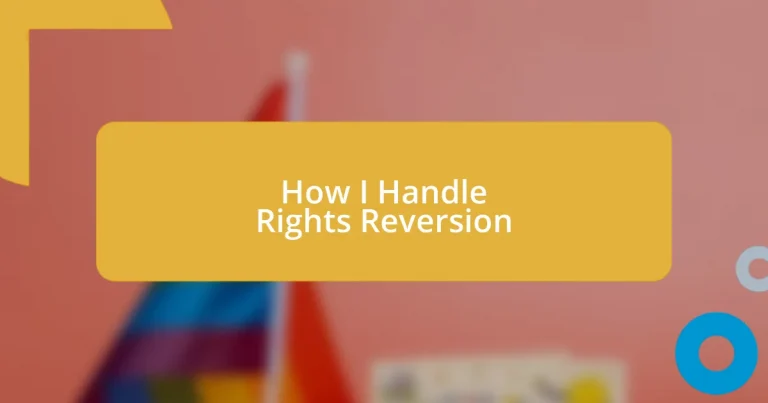Key takeaways:
- Understanding rights reversion is empowering; creators can regain control over their work through careful review of contract terms.
- Key reasons for rights reversion include contract expiration, lack of promotion, outdated content, and creative growth.
- Effective communication and proactive negotiation strategies are essential for successfully reclaiming rights from publishers.
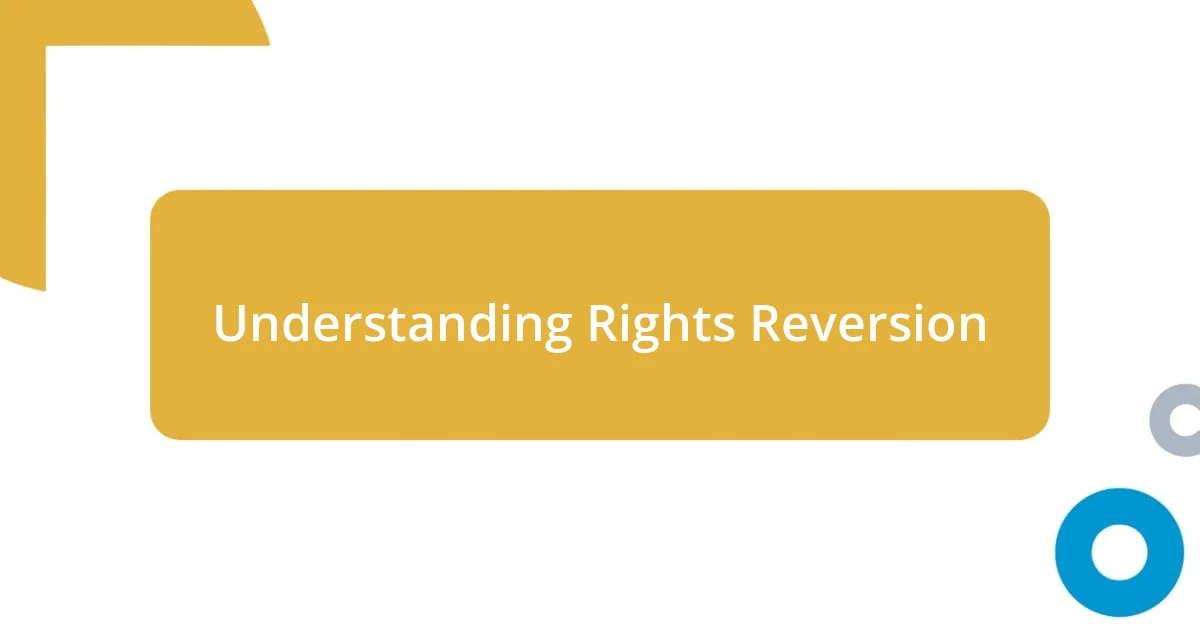
Understanding Rights Reversion
Rights reversion can be a game changer for creators. I still remember the moment I realized I could regain control over my work after years of it being tied up in contracts. It felt like unlocking a door to a room I thought I’d lost access to forever. Have you ever felt stuck and then found a way to reclaim your freedom?
When I first delved into this complex world, I had countless questions swirling in my mind. What happens to my rights when my contract expires? Surprisingly, rights reversion isn’t just about timing; it’s often intricately woven into the specific terms of your contract. Understanding these nuances is crucial, and it can be profoundly empowering to dissect legal language that once felt intimidating.
As I navigated through various agreements, I discovered that many writers overlook the potential to reclaim their rights. This realization sparked a fire in me—an urgency to not just understand my agreements but to advocate for myself. Have you taken the time to review your own contracts? You might find that what you thought was lost forever could still be very much yours for the taking.
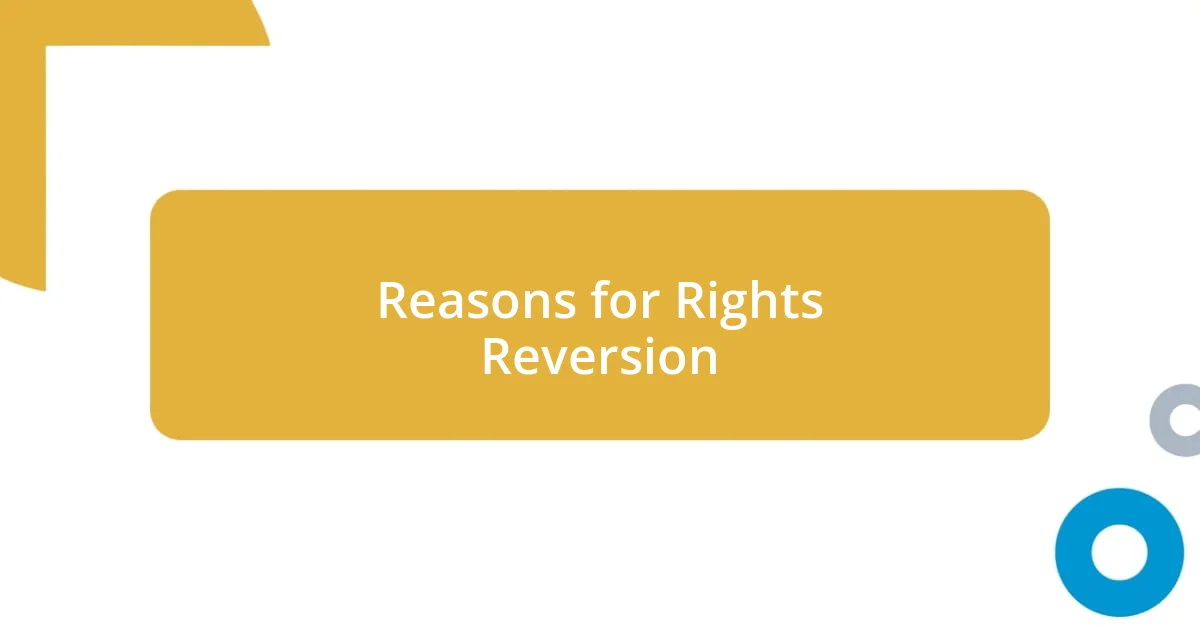
Reasons for Rights Reversion
One of the primary reasons for rights reversion is the passage of time. I can still recall a moment when I realized that my contract had a specific duration, which meant I could eventually reclaim my rights. It was like a lightbulb moment—I felt a sense of hope igniting within me. Knowing that rights could return to the creator after a certain period made me more aware of the importance of timing in any agreement.
Here are some key reasons why rights reversion can come into play:
- Contract expiration: Many agreements have fixed terms that naturally lead to rights reverting back to creators.
- Lack of promotion: If the publisher fails to actively promote or sell the work, it can trigger a reversion clause.
- Outdated content: As markets evolve, works may become less relevant, leading creators to seek rights reversion to reinvigorate their projects.
- Creative growth: Sometimes, artists simply outgrow their original works and wish to repurpose or expand upon them, prompting the need for rights to return to their control.
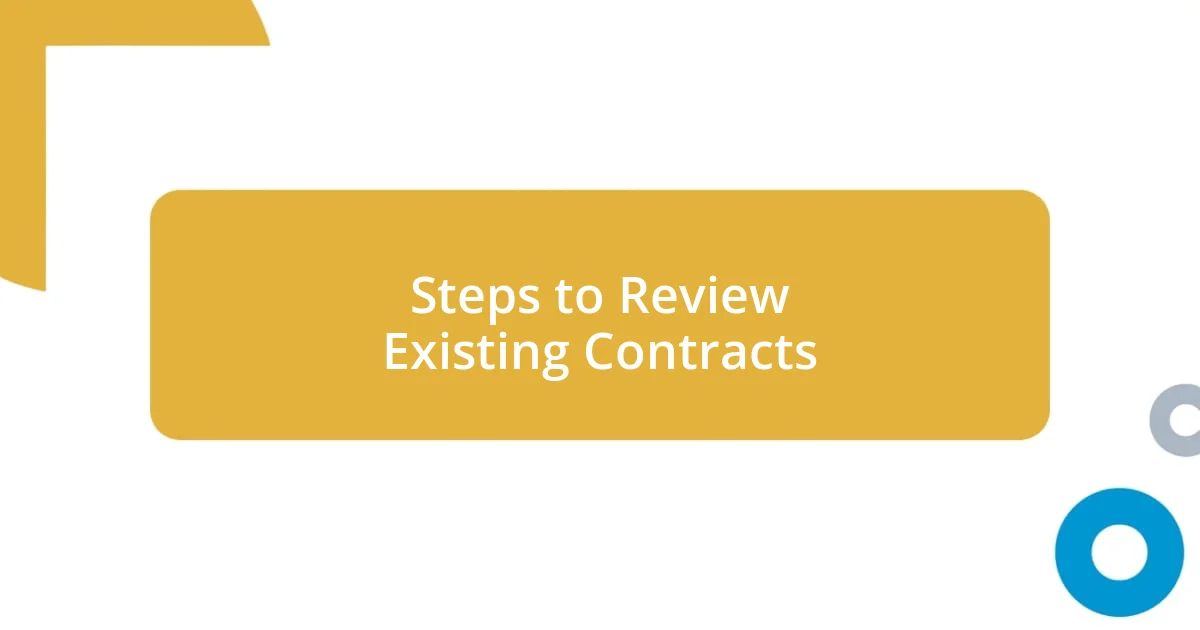
Steps to Review Existing Contracts
In approaching the review of existing contracts, I find it essential to start with a focused mindset. I usually gather all contracts in one place, ensuring I have the latest version, as revisions can often lead to confusion. This initial organization helps me feel less overwhelmed and more ready to dive into the specifics. Have you ever tried sifting through multiple drafts and lost track of what was agreed upon? I know that feeling well!
Next, I take my time to highlight the clauses that directly relate to rights reversion. It’s fascinating how small details can have significant implications. For instance, I once overlooked a seemingly innocuous clause that specified a lack of promotion by the publisher could trigger reversion. That little insight dramatically altered my strategy for reclaiming my work when the time came. It’s worth digging deep and questioning every line—understanding nuances can truly make a difference.
Finally, I recommend making notes of any ambiguous terms or legal jargon that might hinder your understanding. This step is crucial; I often consult with a legal professional to clarify these points. During one of my reviews, I realized a term I thought was beneficial had several hidden conditions. I wish I had sought help earlier in my career—it could have saved me from unnecessary complications.
| Step | Description |
|---|---|
| Gather Contracts | Collect all relevant agreements to have a clear view of what is in place. |
| Highlight Key Clauses | Focus on the terms related to rights reversion and make notes on key points. |
| Seek Clarification | Reach out to legal professionals for understanding terms that are unclear. |
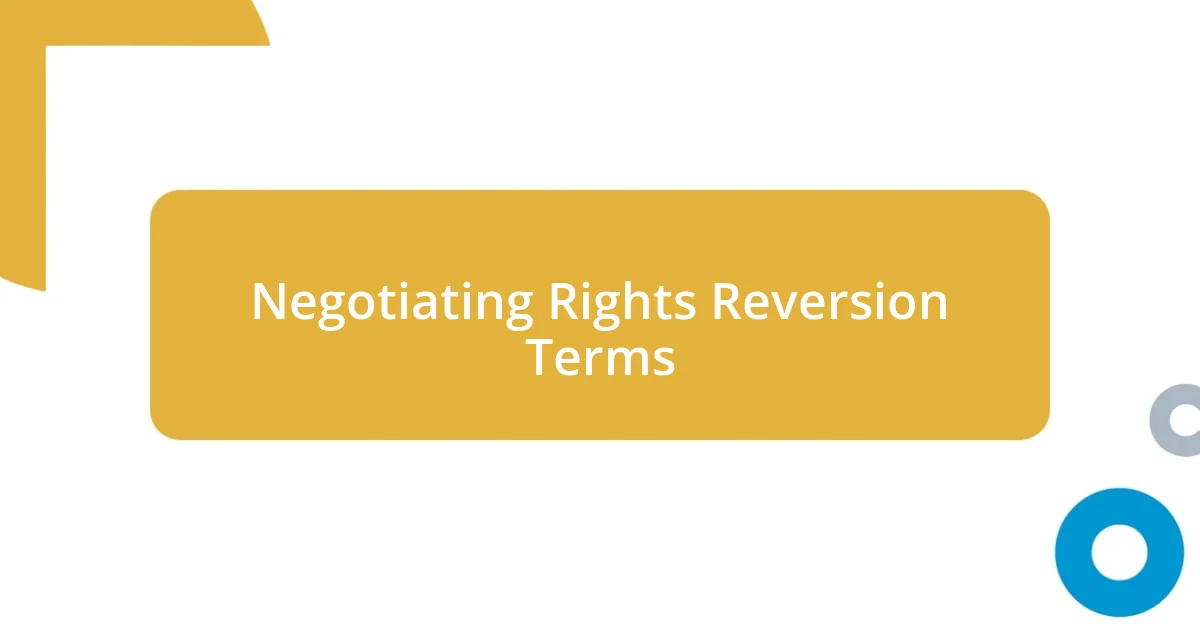
Negotiating Rights Reversion Terms
When it comes to negotiating rights reversion terms, clarity is vital. I remember my first negotiation experience; I was excited but also anxious about how to articulate my needs. It was a challenge to balance confidence with collaboration. Have you ever felt that tension? I’ve learned that expressing your intentions clearly can foster a more open dialog, helping both parties feel more comfortable and understood.
In these negotiations, understanding the precise language in your contract is crucial. I once faced a situation where a term like “active promotion” was not clearly defined. This ambiguity nearly cost me the reversion rights I was seeking. I had to prepare compelling evidence of the publisher’s inactivity, which ultimately led to a favorable outcome. Isn’t it interesting how one word can change everything? Ensuring that both parties agree on definitions can significantly smooth the path toward a successful negotiation.
Lastly, timing can be a game changer. I recall a moment when I decided to initiate talks a few months ahead of my rights expiration date. This proactive approach allowed me to set the stage for a more favorable negotiation climate. Have you considered your own timeline in similar discussions? I often find that being prepared ahead of time empowers me and places me in a stronger negotiating position. Embracing this strategy has transformed my experiences in reclaiming creative control.
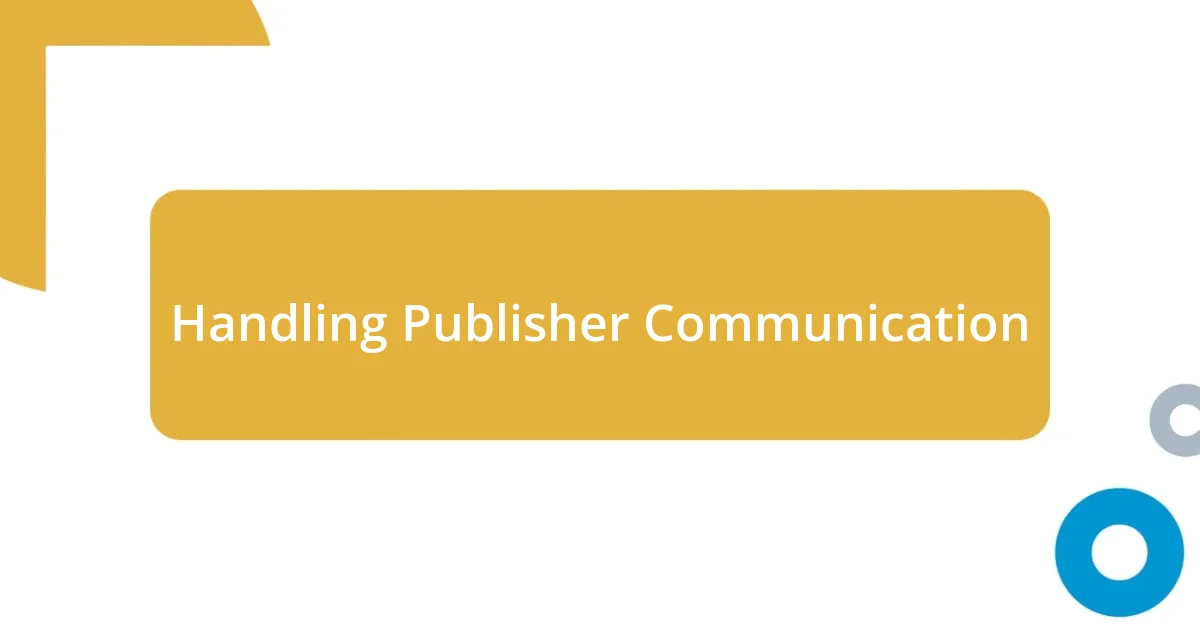
Handling Publisher Communication
When reaching out to publishers, I approach communication with a blend of professionalism and personal touch. One time, I had to send a rather tense email regarding rights reversion. Instead of diving straight into demands, I started with a genuine expression of gratitude for the partnership we had established. This simple act of kindness seemed to soften the tone of our conversation and opened the door for a more collaborative discussion. Have you noticed how a little warmth can go a long way, even in business?
I like to keep my messages clear and to the point, especially when discussing something as crucial as rights reversion. It’s easy to get lost in the details, but I’ve learned that being concise keeps everyone focused. In one instance, I included a detailed timeline of events alongside my request. This clarity helped the publisher immediately understand my position and the urgency behind it. Have you ever had that moment where clarity made everything easier? It certainly brought us closer to a resolution.
Follow-up is another essential aspect of handling publisher communication. I once sent an initial inquiry and waited, feeling anxious as the days passed without a response. Instead of letting that anxiety fester, I learned to send a polite follow-up a week later. That nudge not only conveyed my commitment but also reminded them of my request. How often do you find yourself waiting too long to check back in? Engaging proactively can make a significant difference—and it often shows that you respect the other party’s time while also valuing your own.
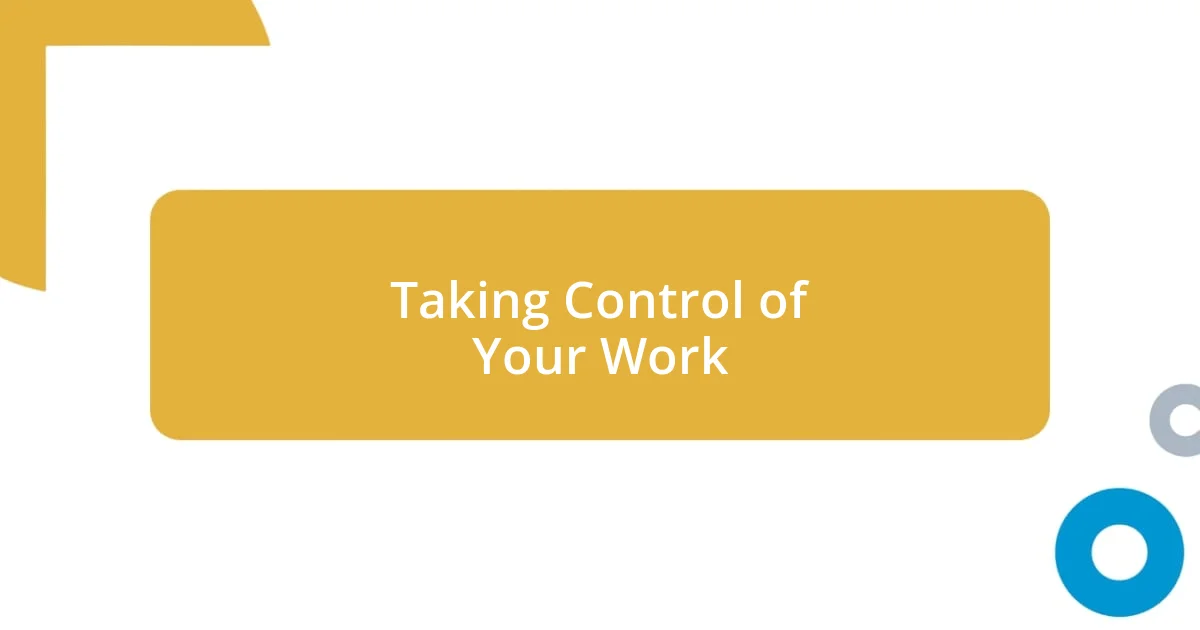
Taking Control of Your Work
Taking control of your work starts with understanding your rights and actively pursuing their reversion. There was a time when I felt trapped by my contract, unable to see a path forward. It was daunting. But once I realized that I had the power to ask for what was rightfully mine, it became a liberating journey. Have you ever felt like your creative output was held hostage? Knowing you can reclaim that ownership is truly empowering.
I’ve found that meticulous record-keeping aids me immensely in asserting my rights. For instance, I began logging all my communications with publishers, noting the dates and details of our discussions. This habit not only kept me organized but provided solid backing during negotiations. Has maintaining a clear record helped you in your professional dealings? I believe that being well-prepared lays the groundwork for a more confident approach when taking control of your work.
Additionally, embracing the notion of self-advocacy has significantly shaped my experience. I remember attending a writer’s conference and participating in a panel discussion about rights reversion. Listening to others share their successes and struggles ignited a spark in me. It taught me that I wasn’t alone in this process; many of us navigate similar waters. How often do we forget that we’re part of a community? Sharing these experiences not only equips us with knowledge but also encourages a culture of mutual support, making it easier for all of us to take charge of our creative destinies.
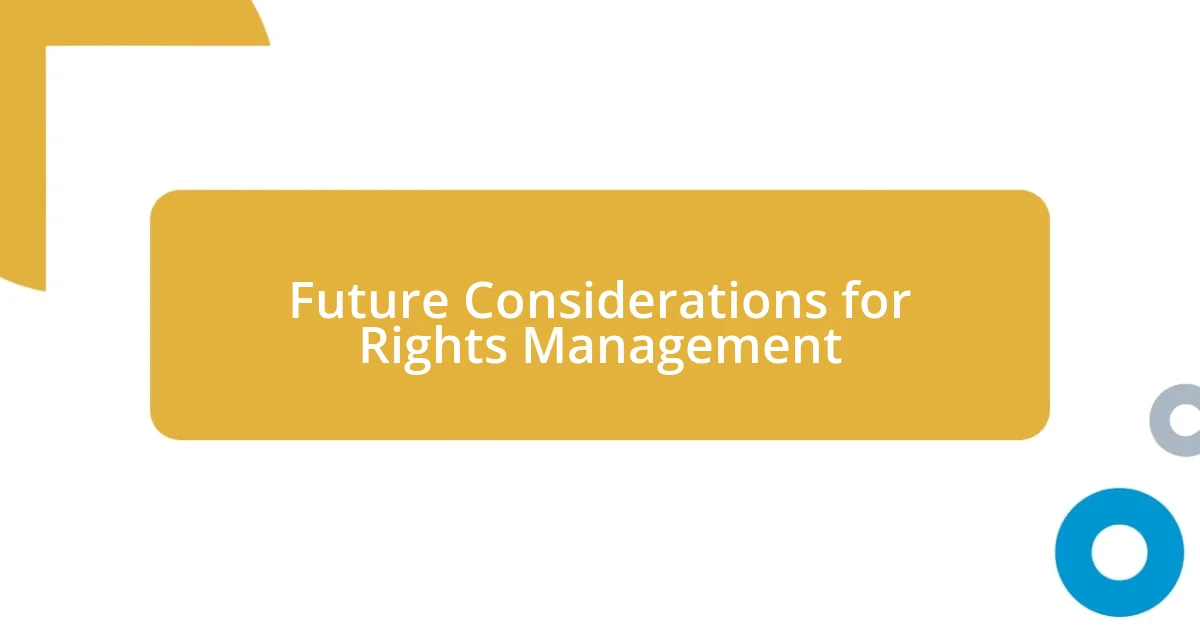
Future Considerations for Rights Management
The future of rights management is shifting dramatically as technology evolves. Recently, I explored new platforms dedicated specifically to rights reversion. I was amazed at how these digital tools simplify tracking ownership agreements and provide alerts for upcoming reversion timelines. Have you considered how technology can free your creative work? Embracing these advancements not only ensures you’re in the loop; it can save you headaches down the road by streamlining the reversion process.
As I think about the future, I realize that building strong relationships within the industry will become even more crucial. Networking isn’t just about exchanging business cards—it’s about creating a support system. I once connected with a fellow writer who shared their insights on navigating rights management. That conversation opened my eyes to new strategies and potential partnerships. Have you ever had a single conversation that completely changed your perspective? These connections can lead to collaborations that enhance my rights management approach and protect my creative interests.
Looking ahead, it’s also important to remain adaptable. The landscape of publishing is continuously changing, and I’ve learned that flexibility is key. I remember a time when a publisher changed their policies on rights management, which initially threw me off. Instead of panicking, I took a step back and reassessed my options. It turned out to be an opportunity for growth rather than a setback. Are you prepared to pivot when necessary? The ability to embrace change can be your greatest ally in navigating the complexities of rights reversion in the future.












